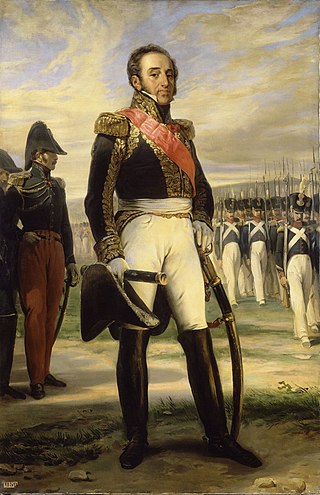
Louis-Gabriel Suchet, duc d'Albuféra, was a French Marshal of the Empire and one of the most successful commanders of the French Revolutionary and Napoleonic Wars. He is regarded as one of the greatest generals of the Napoleonic Wars.
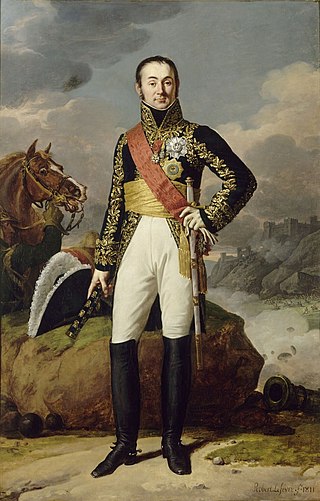
Nicolas Charles Oudinot, comte d'Oudinot, duc de Reggio, was a Marshal of the Empire. He is known to have been wounded 34 times in battle, being hit by artillery shells, sabers, and at least twelve bullets over the course of his military career. Oudinot is one of the Names inscribed under the Arc de Triomphe, Eastern pillar Columns 13, 14.

Jean Lannes, 1st Duke of Montebello, Prince of Siewierz, was a French military commander and a Marshal of the Empire who served during both the French Revolutionary and Napoleonic Wars.
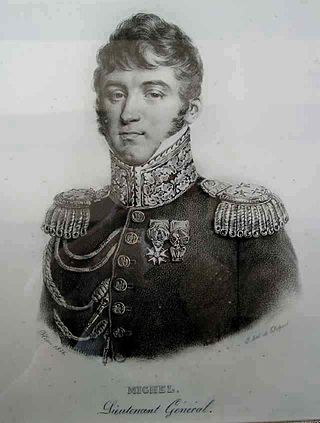
General Claude-Étienne Michel, an officer in Napoleon's army, eventually rose to second in command of the Chasseur Division of the Imperial Guard and commander of the Brigade of the Middle Guard. He may actually be the officer who uttered the words often attributed to Pierre Cambronne "La Garde meurt et ne se rend pas" "The Guard dies, and does not surrender".

Étienne Maurice Gérard, 1st Comte Gérard was a French general, statesman. He served under a succession of French governments including the ancien regime monarchy, the Revolutionary governments, the Restorations, the July Monarchy, the First and Second Republics, and the First Empire, becoming prime minister briefly in 1834.
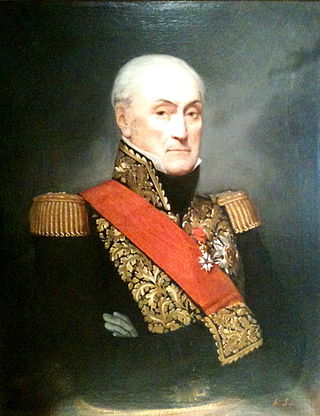
Joseph, comte Souham was a French general who fought in the French Revolutionary Wars and the Napoleonic Wars. He was born at Lubersac and died at Versailles. After long service in the French Royal Army, he was elected to lead a volunteer battalion in 1792 during the French Revolution. He was promoted to general of division in September 1793 after playing a prominent role in the defense of Dunkirk. In May 1794 with his commander absent, he took temporary command of the Army of the North and defeated the Coalition army at Tourcoing. He led the covering forces at the siege of Ypres and participated in the successful invasion of the Dutch Republic. He spent many years in occupation duties in Holland and then his career suffered because of his association with Pichegru and Moreau. Starting in 1809 he was employed in Spain during the Peninsular War, winning the Battle of Vich where he was wounded. When he was in army command again, he forced Wellington's army to retreat at Tordesillas in 1812 and became one of the few French generals to remain undefeated in the war. The following year he led a division at Lützen and a corps at Leipzig. He remained loyal to the Bourbons during the Hundred Days.

Claude-Victor Perrin, Duke of Belluno was a French military commander who served during the French Revolutionary Wars and the Napoleonic Wars. He was made a Marshal of the Empire in 1807 by Emperor Napoleon I.

General Count Jean Rapp was a French Army officer during the French Revolutionary Wars and the Napoleonic Wars and twice governor of the Free City of Danzig. He served as Aide-de-camp to French Generals Louis Desaix and later Napoleon Bonaparte, whose life he saved on multiple occasions.

Louis Friant was a French general who fought in the French Revolutionary Wars and the Napoleonic Wars.
General of Brigade Victor Gabriel Levasseur, 1st Baron Levasseur commanded a French infantry brigade in the Grande Armée of Emperor Napoleon I. Leaving civilian life, he enlisted in a volunteer battalion in 1792 and was wounded at the 1793 Siege of Mainz. In the Rhine Campaign of 1796 he fought at Rastatt and Kehl. Promoted general of brigade in 1800, he fought at Hohenlinden. Under Napoleon he commanded a brigade in the IV Corps at Austerlitz in 1805, Battle of Jena in 1806 and Eylau in 1807, where he was wounded. He became a Baron of the Empire in 1808, commanded posts in the interior and served as a military instructor. He died in 1811 at Valognes.

Jean-Antoine Verdier was a French General during the Revolutionary and Napoleonic Wars.
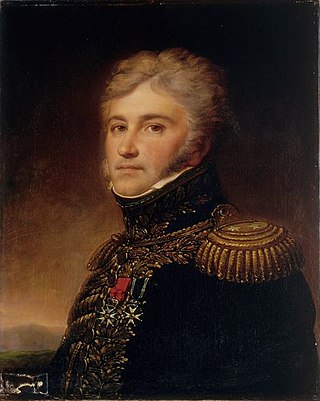
Général de division Louis, Comte Lepic was a French cavalry commander of the French Revolutionary and Napoleonic Wars. He eventually rose to the rank of général de division and held the prestigious command of the Grenadiers à Cheval de la Garde Impériale, the senior heavy cavalry regiment of the Imperial Guard. He was made a baron in 1809 and then became a count in 1815, after which he was known as Comte Lepic.

Charles-Antoine-Louis-Alexis Morand Comte de l'Empire, was a general of the French army during the French Revolutionary Wars and Napoleonic Wars. He fought at many of the most important battles of the time, including Austerlitz, Borodino and Waterloo.

Édouard Jean-Baptiste, comte Milhaud was a French politician and Général de Division. He is considered one of the best generals of cavalry of Napoleon's army.

Jean Isidore Harispe, 1st Comte Harispe was a distinguished French soldier of the Revolutionary and Napoleonic Wars, as well as of the following period. Harispe was created a Marshal of France in 1851.
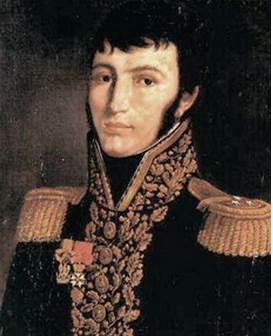
Alexis Joseph Delzons was a French general of the French Revolutionary Wars and the Napoleonic Wars. He was killed in the Battle of Maloyaroslavets. His surname is one of the names inscribed under the Arc de Triomphe, on Column 16.

Pierre François Joseph Durutte joined the French army at the beginning of the French Revolutionary Wars. Rapidly promoted for feats of bravery under fire at Jemappes in 1792 and Hondschoote in 1793, he found himself appointed to serve as a staff officer. He distinguished himself during the Anglo-Russian invasion of Holland in 1799 and received promotion to general officer. During the successful 1800 campaign he fought in Jean Victor Marie Moreau's army. Promoted again in 1803, his career then stalled because of his association with the banished Moreau and his unwillingness to see Napoleon Bonaparte as emperor.

Pierre, baron Berthezène was a French general.
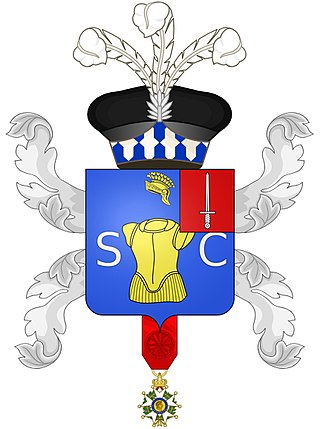
Jean-Chrysostôme Calès was a French military officer who served during the French Revolutionary Wars and the Napoleonic Wars. He was born on 27 January 1769 in Caraman (Haute-Garonne) and died on 21 April 1853 in Cessales (Haute-Garonne).

Pierre Decouz became a French division commander during the later Napoleonic Wars. He was born in the Kingdom of Sardinia but after the region was annexed to France, he joined a volunteer battalion in 1793. He fought in Italy during the War of the First Coalition. He participated in the French campaign in Egypt and Syria, fighting at the Pyramids, Acre and Abukir. After distinguishing himself at Austerlitz in 1805, he was promoted to command an infantry regiment. In 1806–1807 he led his regiment at Auerstädt, Pultusk and Eylau. In 1809 he fought at Eckmühl, Ratisbon and Wagram, winning promotion to general of brigade. After leading an Imperial Guard brigade at Lützen and Bautzen in 1813, he was promoted general of division. He commanded a Young Guard division at Dresden and Leipzig. Still leading a Young Guard division, he was fatally wounded at the Battle of Brienne and died three weeks later. His surname is one of the names inscribed under the Arc de Triomphe, on Column 17.



















